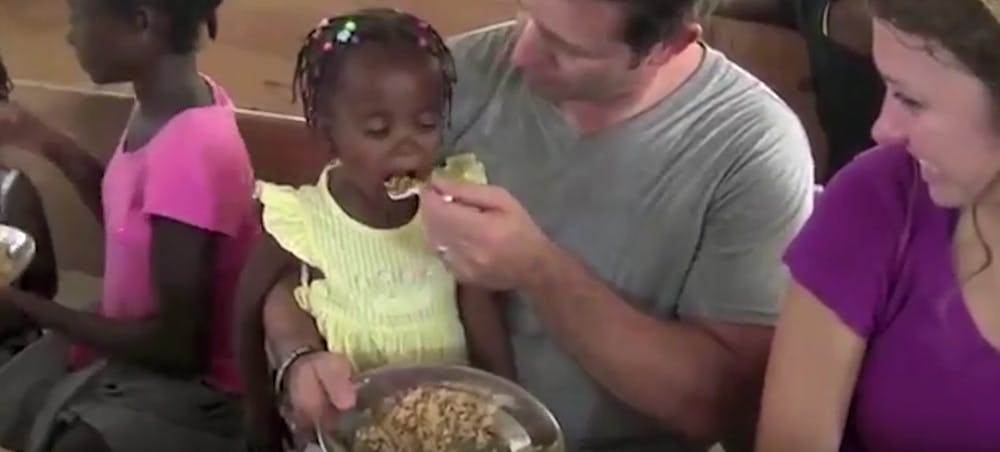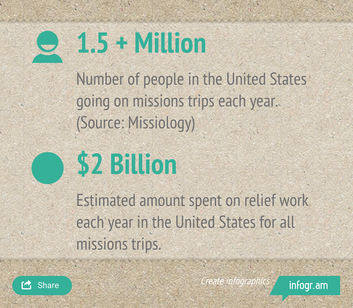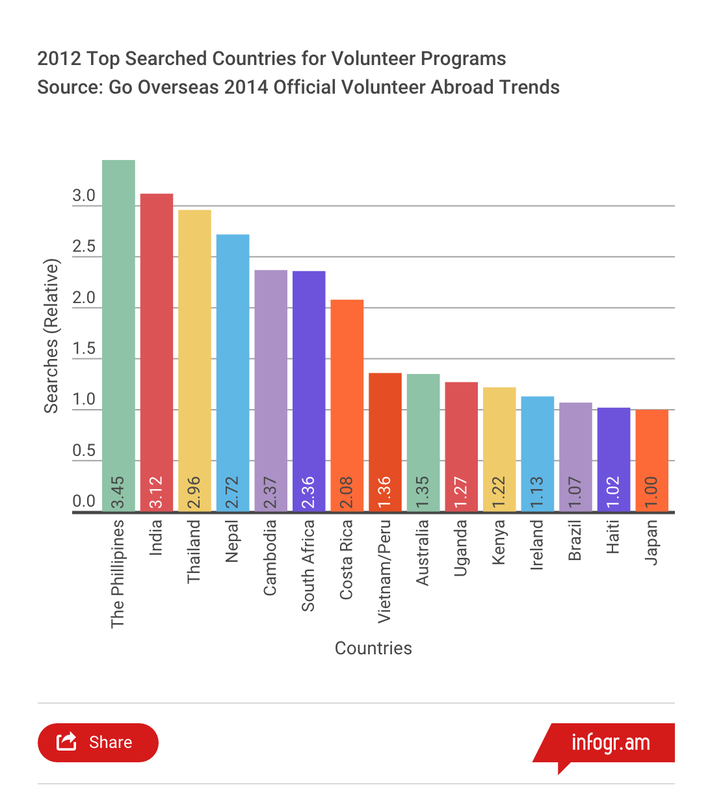The cautions and realities of short-term service trips[youtube=https://www.youtube.com/watch?v=dVkQRkeO3b4&noredirect=1&w=560&h=315]
More than 1.5 million people in the United States participate in a mission trip each year, according to Missiology journal, and with that comes an estimated two billion dollars spent for those efforts (see below infographic).
\0x200B Gone are the days when "serving" meant raking the leaves of an elderly neighbor or washing the feet of a stranger. Thanks to expansive technology, an interconnected global society and advances in transportation, the act of "service" can mean anything from tutoring low socio-economic children in Kentucky, rocking a baby to sleep in Mexico or building a home in Bulgaria. According to Go Overseas, more people are looking to go to Asia than Africa to volunteer their time and resources. (See graph below)Despite the logistics and sometimes overwhelming statistics of need, people of all ages, especially the Millennial generation, are encouraged to serve and "put others before ourselves," said Elon senior Morgan Abate. |
Service in Action
Abate is a part of Elon's Project Pericles, a program aimed at encouraging students over their college careers to practice civil and global responsibility. Each class of Periclean Scholars at Elon works with a specific country and an established local organization in that country to make a positive and sustainable impact.
Likewise, Angela Presley, Groups and Missions pastor for St. Mark's Church in Burlington, North Carolina, agree in the pursuit of serving others, especially with the Christian aspect of service. Through various domestic and international partnerships with groups, volunteers are able to sign up for short-term mission trips.
One of those partners is Feed the Hunger, a Burlington based Christian non-profit that, for than 47 years, donates food, goods and other services to the poor in need, both at home and around the world. The organization also participates in dozens of short-term service trips each year inviting people to "catch the vision" of serving others in order to create a long-lasting impact in the lives of others, according to Director of Projects, Melinda Staples.
Short Comings of Short-Term Service Trips
Despite the amount of people being fed, clothes, and encouraged around the world thanks to international service trips, there can be serious short comings.
Dr. Tom Arcaro, Director of Elon's Project Pericles, says short-term service trips can do more harm than good.
"The best intentions in the world may not be an effective use of that time," Dr. Arcaro said.
One of the main issues with short-term service trips is that it can quickly go from service to voluntourism, or volunteer tourism.
Abate says that social media plays a big role in the emergence of voluntourism.
"Americans, particularly, go abroad to then showcase to the rest of the world,'This is what I'm doing and this what I'm with," said Abate.
Abate recalled when she was serving while studying abroad for a whole semester, rather than a few days or a week, in Ecuador, the difference she saw in those who were there for a short time rather than a longer established time. She, in particular with one group, saw a disconnect in the treatment of people and a more focus on the experience rather than establishing relationships with the locals.
Dr. Arcaro describes this seemingly haughty approach as "riding on my white horse and I'm here to help you."
Pippa Biddle, published in The New York Times and Huffington Post, has written about her realization of the "damage" she created while serving abroad when she was younger. She said there can be disconnect that can happen on short-term service trips especially where a lot of the focus can be taking pictures with "little brown-skinned children" with little regard to the privacy of the children and their families just see how many Facebook likes come from it.
Meanwhile Presley stands by the need to document experiences in order to educate people back home about the positive and negative realities of other countries. Staples says that just because you might not be able to do hard physical labor doesn't mean you can't make a "significant impact" in someone's life, "even for a moment or a day."
So now what?
With billions of people in need of basic necessities, many are divided on what to do if you have a week free and would like to give back.
Abate says, "Don't go" and spend that time giving back to a local community. According to the recent U.S. Census survey, 46.7 million people in the United States live in poverty.
Presley and Staples stress that there can still be good work done, even in a short amount of time that can lead to potential long term relationships and efforts.
Biddle is cautious about international travel for service. She and group of cohort started "Onward," a company that connects eager travelers to engage in local economies around the world.
Whatever the method, Dr. Arcaro stresses service needs to be approached "with eyes wide open."




